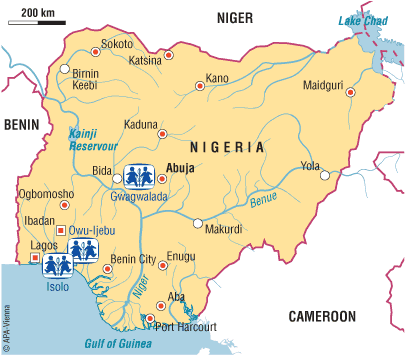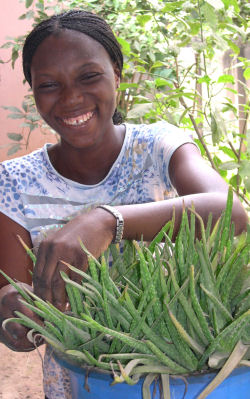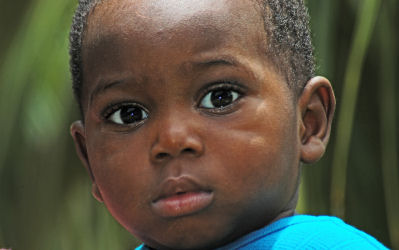SOS Children in Nigeria

Federal Republic of Nigeria on Africa's west coast is one of the continent's most populated countries. It represents many of the problems facing Africa today: increasing industrialisation and the resulting migration of people from rural to urban areas leading to the growth of huge slums and rising social tensions, as well as the challenge to nation building posed by splits between ethnic and religious groups. The economy is dominated by the production of petroleum and while oil wealth has financed major investments in the country's infrastructure and created enormous wealth for some, Nigeria remains among the world's twenty poorest countries in terms of per capita income. One-fifth of Nigerian children die before the age of five, mostly from treatable diseases such as malaria, measles, whooping cough and pneumonia. Malnutrition affects more than 40 per cent of children under the age of five. Only half the population have access to safe water and one-third have no access to health care. Education is under-developed and it is estimated that while higher numbers attend primary school (64% of girls and 72% of boys) figures for secondary school range from 29% of boys and 25% of girls.

Tha charity's first village in Nigeria was established in Isolo, a suburb of Lagos, in 1972. Originally there were five family houses, but since then it has been extended considerably and now has ten family houses built in traditional style with large roofed-over verandahs, providing play space for the children during the rainy season. Four youth house accommodate older children and young people learning skills and trades at the SOS vocational and training centre which offers courses in IT, office skills, design and dressmaking, handicrafts and home economics to both young people from SOS and outside. The village also has a nursery and primary school which children from the local community attend. Gardens have been laid out between the houses to help ensure a supply of fresh vegetables.
With the need for a second community in Nigeria, the charity opened SOS Children Owu-Ijebu opened in 1995 at Owe-Ijebu in the Ogun State, about 145 km east of Lagos, on a 250 acre site donated by the government. The village has twelve family houses and a nursery and primary school both of which are attended by neighbourhood children as well as the SOS children. A small clinic provides medical care for the local community as well as classes in nutrition and hygiene for local women.
As the site at Owu-Ijebu is quite large, part of it has been used to set up a small farming project where cassava, yam, plantains and corn are grown to provide food for the SOS Children's Village with the surplus sold locally.
In 2003, a community support project opened in the centre of Lagos. It provides a variety of social programmes including medical treatment, childcare, skills training for women and assistance and support for people affected by HIV/AIDS. Over 25,000 people a year will benefit from the centre.
A third SOS Children's Village opened in 2007 at Gwagwalada which is near Abuja in the centre of Nigeria. There are 12 family houses for 120 children and a SOS Nursery School for 75 children in three classes. An SOS Primary School and Social Centre are under construction.
See also Aids Orphan Projects in Nigeria, Africa.
Local Contacts

SOS Children in Nigeria
35 Ogunmefun Street, PO Box 660 Shomolu, Pedro, Palmgrove, Lagos
Tel: +234/1/497 42 65 or +234/1/474 61 28 or +234/1/497 56 73
Fax: +234/1/497 56 73
e-mail: sos@infoweb.com.ng
Sponsor a child in Nigeria or learn about child sponsorship
Next Country: North Cyprus